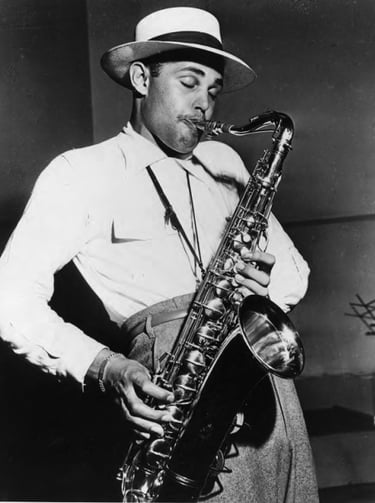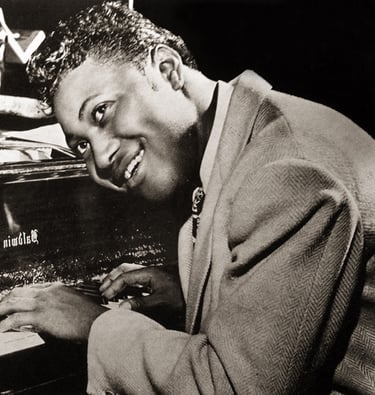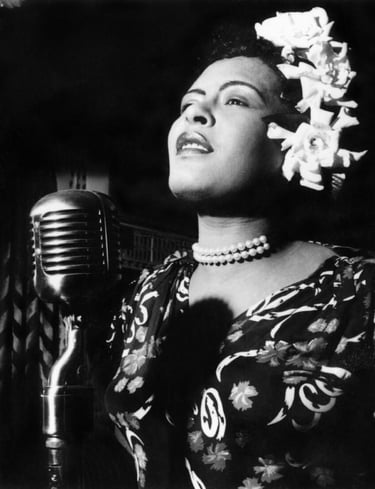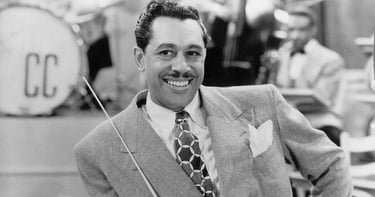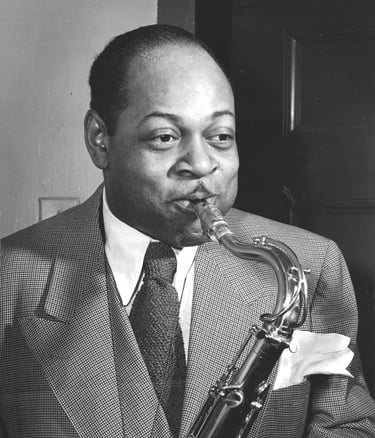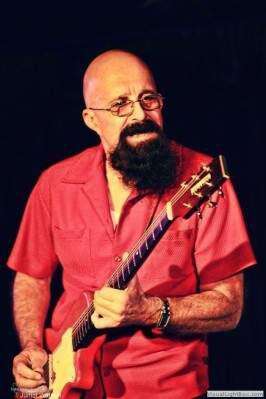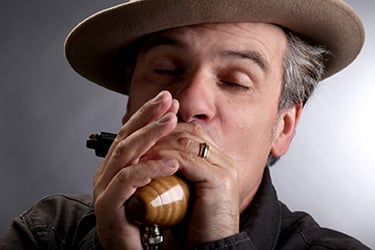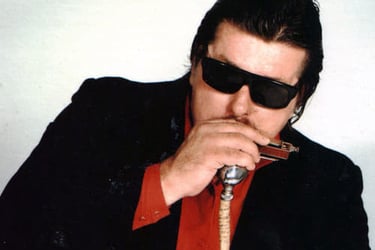
Gurus & Inspirations
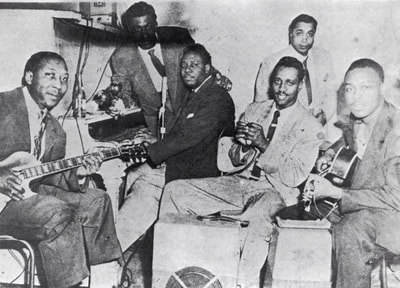

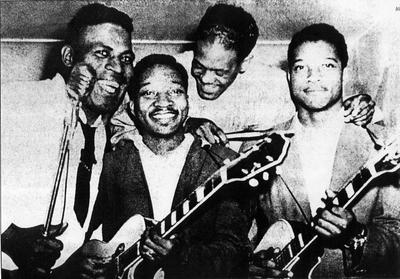

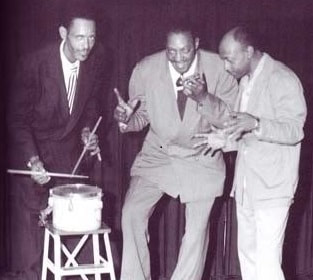

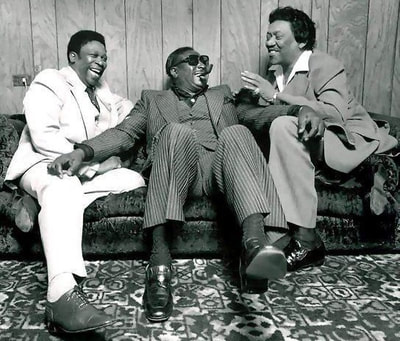

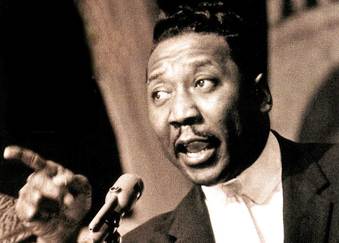

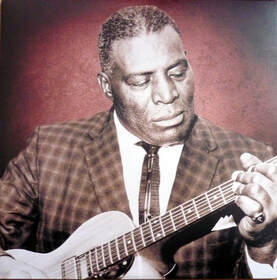

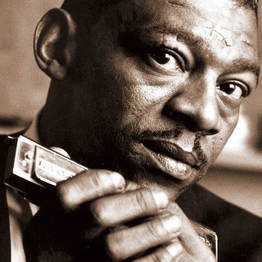

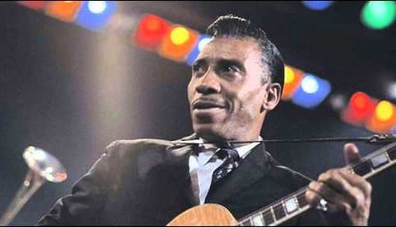

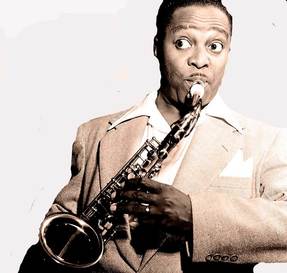

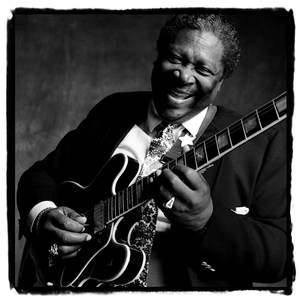

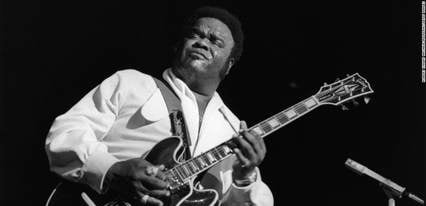

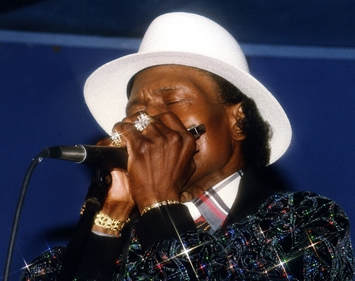

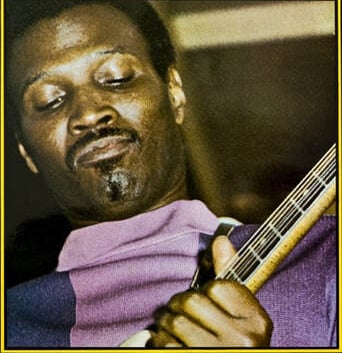

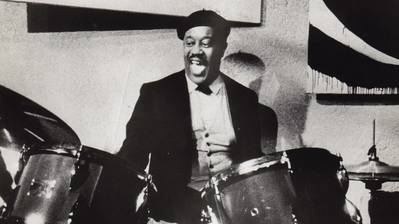

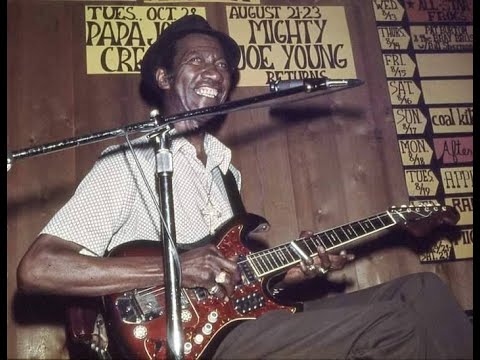

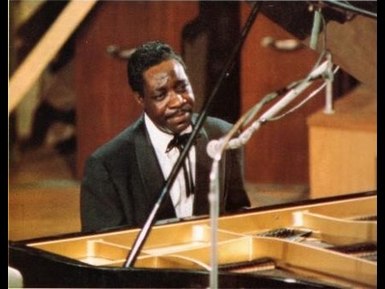

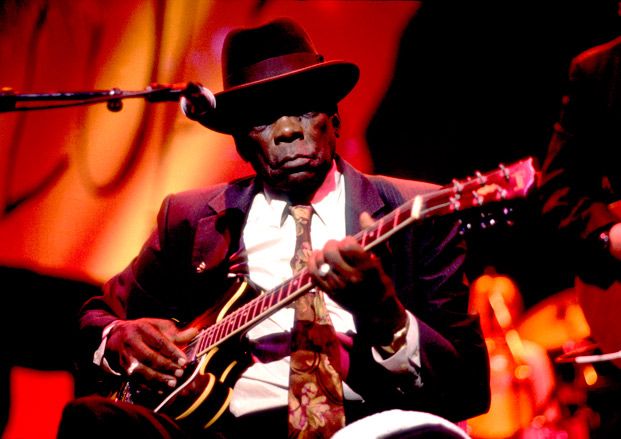

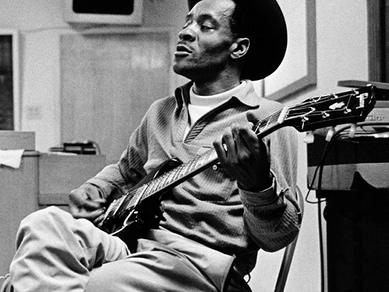

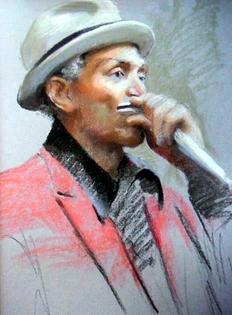

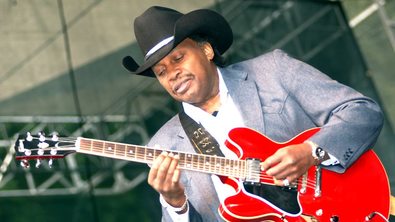

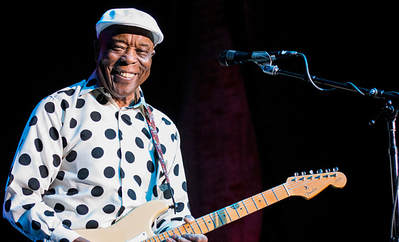

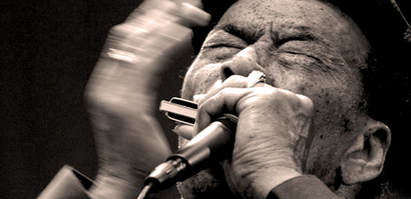

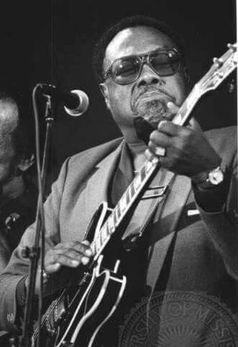

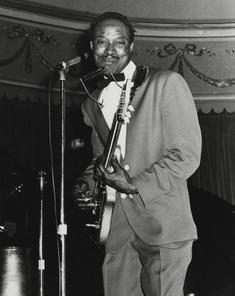

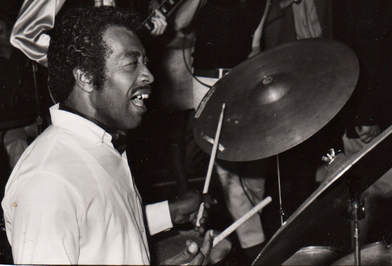

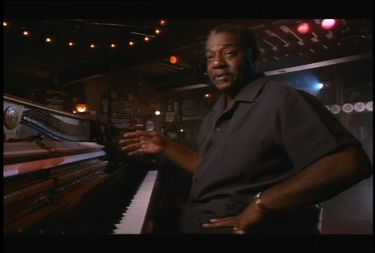

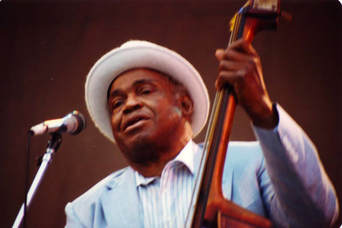

AND THESE GUYS TOO...
There have been many great bluesmen, front men, vocalists, and sidemen, players who have worked clubs, concert venues, recorded in the studio, were mentors to young blues and rock musicians, and even when it wasn't the "pop" music of the day, kept the blues alive, and keep it going today. I haven't had time to write about them all...yet. So here are a few names and faces, each worth checking out. Click on each name to hear them in action.
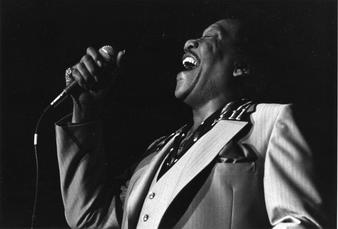

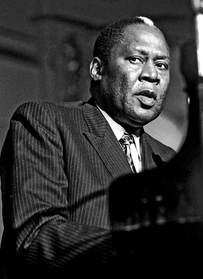

Muddy Waters, Jerome Green, Otis Spann, Henry Strong, Elgin Evans, Jimmy Rogers - Chicago - 1952
Howlin' Wolf, Jody Williams, Earl Phillips, Hubert Sumlin - Chicago - 1956 here...H
B.B. King, Albert King, Bobby 'Blue' Bland New York - 1972
Muddy was one of the founding fathers of Chicago Blues and “the father of Rock & Roll”. His 1952 band, with two guitars, piano, bass, drums and harmonica was a prototype for blues and rock & roll bands; Chuck Berry was his discovery; and the title of his song, Rolling Stone, was appropriated by the preeminent rock music magazine, the greatest rock band of all time, and for the title of the Bob Dylan hit. Muddy was a blues shouter, a sharp dresser, and a ladies’ man who played searing slide guitar. His band had a smooth style.
Willie Nix, Sonny Boy Williamson, Robert Lockwood, Jr. Memphis - 1949
Where does the music we do come from? It's guys like these - band leaders, sidemen, or solo artists with pick-up bands. And it's never about just one person. It's the interplay of multiple guitars weaving around a bass line, harmonica work punctuated by distinct guitar riffs and piano fills, or a lead guitarist with horns comping behind him. If you want to hear how their music sounds, just click on the ARTIST's NAME below and you'll hear and see the artist in action. Hope you enjoy it!
“The first guitarist I was aware of was Muddy Waters. I heard one of his old records when I was a little boy and it scared me to death, because I heard all of those sounds. Wow, what is that all about?" ~ Jimi Hendrix
"I wanted to definitely be a musician or a good preacher or a heck of a baseball player. I couldn't play ball too good - I hurt my finger, and I stopped that. I couldn't preach, and well, all I had left was getting into the music thing.” ~ Muddy Waters
HOWLIN' WOLF
Chester Burnett, the Wolf, was another of Chicago Blues’ founding fathers and at 6'3", and almost 300 pounds, with size 17 shoes, was as rough as Muddy was smooth. A huge man, with a deep, resonant voice, his music had an edge, the guitar solos scorching, and the piano work, formidable. Wolf was a physical performer, a passionate singer, adept playing both harp and guitar, consistently had one of the best bands in Chicago, and pioneered the R&R style band, i.e., guitar-bass-drums-piano-horns, as early as 1950. The edgy guitar work in his music by Willie Johnson, Jody Williams, and later, Hubert Sumlin, was legendary; and many of the songs he made famous – Killing Floor, The Red Rooster, Spoonful, and Back Door Man – became standards of rock bands. re...
Maybe the next fella can do more with it than I, but I don't feel bad about it because when somebody take your number and use it, why, that's lettin' 'em know that you -- that they really appreciate your sound, you know. I wished a lot of 'em 'd take 'em and doin' it. I ain't givin' 'em no trouble copyin'." ~ Howlin' Wolf (on other musicians covering his songs)
WILLIE DIXON
"Big Dixon" was a blues bassist, vocalist, songwriter, arranger, and record producer. His songs, including "Back Door Man", "Evil", "Help Me", "Hoochie Coochie Man", "I Ain't Superstitious", "I Just Want to Make Love to You", "Little Red Rooster", "My Babe", "Spoonful", "Wang Dang Doodle", "Whole Lotta Love", and "You Can't Judge a Book By the Cover", written during the peak of Chess Records, 1950-1965, and performed by Bo Diddley, Howlin' Wolf, Little Walter, Muddy Waters, and Sonny Boy Williamson, influenced a worldwide generation of musicians.
His song writing and studio work made him one of the most influential architects of the post-World War II sound of Chicago blues. He also was an important link between blues and rock and roll, working with Chuck Berry and Bo Diddley in the late-1950s; and his songs were covered by some of the biggest bands of the 1960s and 1970s, including the Allman Brothers Band, Bob Dylan, Cream, the Doors, the Grateful Dead, Led Zeppelin, the Rolling Stones, and the Yardbirds. xt here...
"The blues will always be, because the blues are the roots of all American music." ~ Willie Dixon
LOUIS JORDAN
Louis Jordan “the Father of Rhythm ‘n Blues” was a jazz, blues and rhythm ‘n blues band leader from the 1930s to the 1950s, known as “King of the Jukebox” because of the number of hit records he and his band, the Tymphany Five, produced. Jordan was a talented singer and instrumentalist with great comedic flair; a leading practitioner, innovator and popularizer of "jump blues". His hits included, Keep A-Knockin’, Choo Choo Ch’boogie, Don’t Let the Sun Catch You Cryin’, Knock Me A Kiss, Caledonia, Let the Good Times Roll, and a contender for the first Rock & Roll record, Saturday Night Fish Fry.
Fact: To this day Louis Jordan still ranks as the top black recording artist of all time in terms of the total number of weeks at #1 -- his records scored an incredible total of 113 weeks in the #1 position (the runner-up being Stevie Wonder with 70 weeks).
T-BONE WALKER
Aaron "T-Bone" Walker was a blues guitarist, singer, pianist and songwriter, and one of the most important pioneers of the electric guitar, his career spanning from the 1920s to 1970s. An innovative soloist, he helped popularize “jump blues”. He was a major influence on the playing style of B.B. King, Chuck Berry, and Jimi Hendrix, and by extension, every guitarist who imitated their styles in blues and rock.
T-Bone Walker was a big influence on just about every guitar player around." ~ Johnny Winter
"If T-Bone Walker had been a woman, I would have asked him to marry me. I'd never heard anything like that before: single-string blues played on an electric guitar." ~ B.B. King
Among his many hits were Stormy Monday, and T-Bone Shuffle. He was identified with the large (jazz style) arch-top guitars he played and was famous for playing the guitar behind his head, back, with his teeth, or while doing the splits. T-Bone toured Europe with Jazz at the Philharmonic and worked with top-quality jazz and studio musicians throughout his career.
B.B. KING
The man introduced onstage as "...the undisputed King of the Blues", ranked #3 on Rolling Stone Magazine’s list of the "Top 100 Guitarists", won 15 Grammy Awards, played over 10,000 gigs during his career, sometimes working 250 nights in a year. Influenced by a range of guitarists from Lonnie Johnson and T-Bone Walker to Django Reinhardt and Charlie Christian, B.B. was always adding to his repertoire. This “blues ambassador” crossed musical genres and in his 89 years directly influenced more rock guitarists than any other bluesman, and did more to bring blues to world audiences than anyone else. B.B passed in 2015.
"I gave it my absolute everything I had in that howl at the start of the song. And then B. B. King opened up his mouth and I felt like a girl. We had learned and absorbed, but the more we tried to be like B.B., the less convincing we were." ~ Bono
At the height of the Beatles’ fame, asked his ambition, he answered that he wanted to, “…play guitar like B.B. King.” ~ John Lennon
"On the conflict of being a blues musician: “The blues was like that problem child that you may have had in the family. You was a little bit ashamed to let anybody see him, but you loved him. You just didn't know how other people would take it.” ~ B.B. King
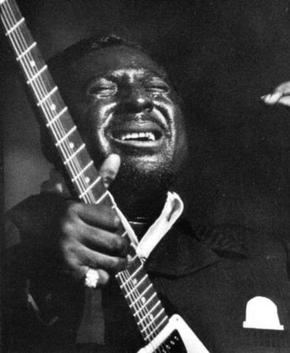

ALBERT KING
No discussion of great contemporary blues guitarists would be complete without Mr. Albert King. His was “the Memphis Sound”. A huge man, pipe clenched between his teeth, his Flying V guitar cradled as he bent the strings mercilessly, the horn players doing dance steps in unison. Albert rocked arenas around the world. His influence is evident in players from Otis Rush to Jimi Hendrix and he was the inspiration to a generation of blues guitarists including SRV.
"I play single notes. I can play chords but I don’t like ’em, and I don’t have time for them. I’m paying enough people around me to play chords." (laughing) - Albert King
LITTLE WALTER
Marion "Little Walter" Jacobs is acknowledged as the greatest blues harmonica player ever, setting the standards that would be emulated by others. An unparalleled innovator, his jazz-oriented, electronically amplified harp playing revolutionized blues in the 1950's providing the centerpiece on countless recordings by Walter, Muddy, Jimmy Rogers, Bo Diddley, and others.
"Me and my harp had a love affair from way back" ~ Little Walter
"...Who's the king of all postwar blues harpists, Chicago division or otherwise? Why, the virtuosic Little Walter, without a solitary doubt. The fiery harmonica wizard took the humble mouth organ in dazzling amplified directions that were unimaginable prior to his ascendancy. His daring instrumental innovations were so fresh, startling, and ahead of their time that they sported a jazz sensibility, soaring and swooping in front of snarling guitars and swinging rhythms perfectly suited to Walter's pioneering flights of fancy." ~ bluesharp.ca website...
JUNIOR WELLS
Amos "Junior" Wells was one of Chicago’s premier blues harmonica players and performers. He combined great harp playing skills with the soul and showmanship of James Brown and Jr. Walker. He originally performed with the Aces (Louis Myers, David Myers, and Fred Below), then was asked to join Muddy Waters' band after Little Walter left to promote the single, "Juke", using the Aces as his backup band. Beginning in the 1960's, Junior recorded and toured extensively with guitarist, Buddy Guy, becoming an integral part of the rock scene and later taking the blues to new audiences worldwide.
"Junior Wells is a blues legend, a dynamic package of lean, mean talent, laser-focused energy and razor-sharp style. A singer-harpist whose influence has far outpaced his name recognition... From the earliest days, Wells has taken pride in his ultra-slick stage dress (immaculately pressed sharkskin suits; gaudy gold jewelry; porkpies and fedora hats) and dynamic showmanship." ~ Buddy Seigal - Los Angeles Times
SONNY BOY WILLIAMSON
Originally Alec or "Rice" Miller, Sonny Boy was a well-known harmonica player and radio artist in the South in the ’30s and '40s, hosted the "King Biscuit Time" radio program along with Robert Lockwood Jr. on KFFA, Helena, Arkansas starting in 1941, and was a popular performer after migrating to Chicago in the ’50s. He was one of the first blues artists with a radio show and was widely recorded and often emulated - a major influence on prominent players including James Cotton and Jr. Wells. In the 1960’s he enjoyed great popularity in England and Europe, touring and recording with U.S.-based blues veterans and young British blues musicians, Jimmy Page and Eric Clapton.
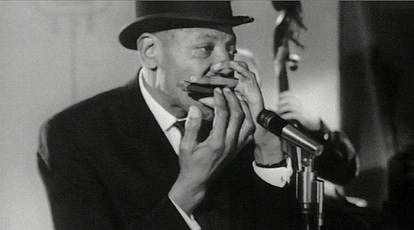

"They didn't call him the king of the harmonica for nothing...He was a big dude who blew the blues out of that sucker until there was nothing left to blow. He played sitting down using his feet like a drum - stomping loud and hard - shouting and inhaling like his life was on the line." ~ B.B. King
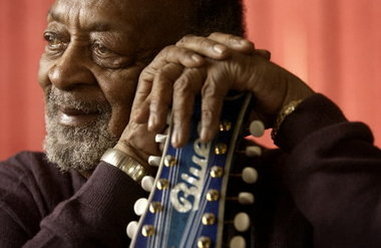

ROBERT LOCKWOOD JR.
Robert Lockwood Jr., the stepson of legendary Delta bluesman, Robert Johnson; a self-described “jazz guitarist who plays blues”, he was at the forefront of the electric blues revolution, and Chicago's most in-demand blues session guitarist in the 1950’s. His arrangements, riffs, and jazz-oriented chordings were instrumental in creating the “sound” of the music of Little Walter and Sonny Boy Williamson, and he was a mentor to several great blues guitarists including B.B. King and Luther Tucker. In the latter third of his career he switched over to playing a twelve string guitar ("just because it was more difficult"), still playing everything from Robert Johnson's delta blues to Chicago blues to the jazz standards made popular by Count Basie and Gene Ammons. Robert had his own band in Cleveland for over 40 years, recording numerous CD's, and touring worldwide until just prior to his passing at age 91, in 2006.
"A professional musician at age 15, Lockwood reached wider audiences through radio work in the early 1940's from a radio station in Helena, Ark. One listener, B.B. King, became Lockwood's pupil, and years later Lockwood advised the addition of horns to King's band to disguise his imperfect sense of keeping time." ~ Washington Post
LUTHER TUCKER
Protégé of Mr. Robert Lockwood Jr., and guitarist with Little Walter’s band for almost 8 years, Luther Tucker began his professional career at age 14 working with pianist Sunnyland Slim, and Tucker's uncle, saxophonist, J.T. Brown. A contemporary and teenage friend of Magic Sam, Otis Rush, and Freddy King, Tucker developed a distinctive sound and was one of the most prolific and talented Chicago blues guitarists. Tucker played and recorded with Little Walter, Howlin' Wolf, Sonny Boy Williamson, Muddy Waters, Smokey Hogg, Slim Harpo and many others. He was featured on over 300 recordings and was a founding member of the James Cotton Blues Band. Unfortunately, Tucker's two CD’s were not released until after his death.
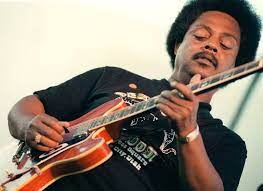

"If others became the stars it was only because of Tucker’s disposition. His status as a sideman was determined more by his personality than his talent.” ~ Elvin Bishop
Earl Hooker was a great blues guitarist, perhaps best known for his slide playing. He was equally adept at genres from blues to country to jazz. Considered a "musician's musician", Hooker fronted his band as well as performing with artists including Junior Wells, Muddy Waters, Sonny Boy Williamson and his cousin, John Lee Hooker. Earl was influenced by the slide style of Robert Nighthawk and the urban jazz style of T-Bone Walker. His popular Chicago-area slide guitar instrumental, “Blue Guitar", was later overdubbed with a vocal by Muddy Waters becoming the popular single, “You Shook Me".
"…To me, he is the best of modern guitarists, period! With the slide, he was the best. It was nobody else like him. He was just one of a kind." ~ B.B. King
JOHN LEE HOOKER
John Lee Hooker was a highly influential singer-songwriter and guitarist. Hooker could be said to embody his own unique, metrically free, genre of the blues, taking country blues and incorporating his own “talking blues style”, with a driving boogie-woogie rhythm in his guitar playing. His best-known songs include "Boogie Chillen'", "I'm in the Mood", and "Boom Boom", the first two reaching #1 on the Billboard R&B chart.
Hooker began performing in Memphis in the 1930s, moving on to Detroit in 1948. A favorite with fellow blues and rock musicians and fans, he was billed as “The King of the Boogie”. He recorded often (and under many different pseudonyms) as a solo artist - guitar, vocal, and tapping foot; with his band; and with other performers, including Carlos Santana, Bonnie Raitt, and Van Morrison. In 1989 he appeared as the title character in Pete Townshend's “The Iron Man: A Musical”.
"In all the long history of the blues, there has been no figure more singular than John Lee Hooker.... Where other singers rhymed, he sang in blank verse; where other guitarists might skip through the changes, he would play entire songs on one or two chords; and where other blues veterans were fortunate to be rediscovered once, he bounced repeatedly from obscurity or semi-retirement back into the limelight." ~ Tony Russell - The Guardian
JAMES COTTON
James Cotton was a harmonica player and vocalist whose resume included being mentored by Sonny Boy Williamson (Rice Miller), playing with the Howlin’ Wolf band in Memphis, and ten years with Muddy Waters prior to venturing out on his own in the late 1960’s. He was known for his rich and powerful tone, proficiency at emulating Little Walter and Sonny Boy recordings, and his ability to improvise.
While he toured and recorded widely from the early 1970s, he reached his zenith in the late 1960s when The James Cotton Blues Band (with Luther Tucker, Francis Clay, Alberto Gianquinto, Bobby Anderson, and later, Bill Nugent) was a featured headliner on the rock scene, sharing stages worldwide with bands like Cream, the Who, Big Brother & the Holding Company, and Fleetwood Mac.
In his heyday, Cotton was a showman, pacing the width of the stage as he sang, going into the audience while performing, and turning somersaults on stage while playing. Cotton was the first to admit, "I just want everybody to have a good time because I'm going out to have a good time." Cotton battled throat cancer in the 1990s but continued to tour and play harp, using singers or members of his backing band as vocalists, until his death at age 81 in 2017.
Listen to Cotton’s harmonica playing on the album — gritty, gutsy, ferociously uninhibited — and you’re hearing what great blues harp work is all about. No wonder they call him Superharp…One of the most dynamic harpist-bandleaders in the business. ~ Chicago Tribune
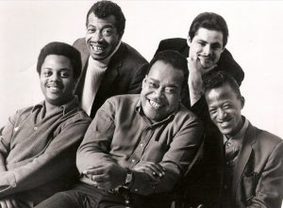

Tucker, Clay, Cotton, Gianquinto, and Anderson
OTIS SPANN
Otis Spann began playing at age 14, migrating to Chicago in 1946. He gigged on his own and with guitarist Morris Pejoe. In 1952 he replaced Big Maceo Merriweather as Muddy Waters' piano player and participated in his first recording session with the band in 1953. From 1952 to 1968 Spann was a full-time member of the Muddy's band, periodically recording as a solo artist. In 1954 his first single, "It Must Have Been the Devil", featured B.B. King on guitar. Spann did session work with artists including Chuck Berry, Howlin' Wolf, and Bo Diddley, as well as classic blues albums of his own featuring Robert Lockwood Jr. as his accompanist. Spann passed at age 42.
"Otis played the deepest blues we ever heard - He'll play forever in our hearts" ~ Spann's headstone, Burr Oak Cemetery, Alsip, Illinois
OTIS RUSH
Otis Rush, singer and guitarist, had a distinctive guitar style which featured a slow burning sound and long bent notes. Often compared to Albert King, Otis is left-handed and, unlike many other left-handed guitarists, plays a left-handed instrument strung upside-down with the low E string at the bottom. His sound, like that of Magic Sam and Buddy Guy, is referred to as “West Side” blues (distinct from the “harmonica bands” of Chicago’s South Side). He became an influence on many guitarists including Peter Green, Michael Bloomfield and Eric Clapton. His song, "I Can't Quit You Baby" reached No. 6 on Billboard's R&B chart in 1956. His best known songs include "Double Trouble", "All Your Love (I Miss Loving)", “Homework”, and “So Many Roads”.
MAGIC SAM
Samuel "Magic Sam" Maghett was one of the greatest Chicago Blues guitarists and singers; his life was cut short by a heart attack at 32. He combined unequaled, rapid-fire, melodic, guitar playing with a voice reminiscent of Sam Cooke. His classic solo in Sweet Home Chicago is so famous that the song was dedicated to him in the Blues Brothers movie. His album, West Side Soul, is regarded as one of the greatest Chicago Blues albums of all time.
"Magic Sam had a different guitar sound. Most of the guys were playing the straight 12-bar blues thing, but the harmonies that he carried with the chords was a different thing altogether." ~ Willie Dixon
Referring to the young British musicians: "They want to play the blues so badly...and that's just how they play it - badly!" ~ Sonny Boy Williamson
"It was me, Otis Rush, Magic Sam, and Freddie King. We was just teenagers, sittin' on the step messin' around, doin' our little thing on guitar. But Otis, he was the first guy could play like Muddy. We all wanted to do that." ~ Luther Tucker
"I was staying with my sister and messing around with the guitar every day for my own amusement. Then she took me around and introduced me to Muddy Waters, Jimmy Rogers, Little Walter, and the first time I saw that onstage, it inspired me to play. I thought that was the world." ~ Otis Rush
FRED BELOW
Fred Below was a schooled jazz drummer, the house drummer at Chess Records, and member of "The Aces" (along with Dave and Louis Myers), a backup band to both Jr. Wells and Little Walter. Below set the standard for Chicago blues drummers and played on thousands of blues, rock, and jazz recordings.
On playing his first blues session: "I had a little trouble that first day. It didn't make any sense. But I was back the next day and I had it down!"
Describing the most exhilarating experience he ever had (touring Africa in 1967): "I was in drumming country, and I had my eyes, ears, and fingers all ready to learn anything I could pick up." ~ Fred Below
"Although T-Bone Walker practically invented this rawhide style of electric blues, it was King who revved it up for the rock crowd by hoeing the turf between Walker and B.B. King." ~ Michael Corcoran - Austin360
HOUND DOG TAYLOR
Theodore Roosevelt "Hound Dog" Taylor was one of the premier slide guitar players in Chicago. While there were other great slide guitarists – Elmore James recorded more hit singles, and Earl Hooker was technically superior – “Dog” played a ragged, rockin’ style, and might open his set with a laughing comment like, "I'm gonna play all night long. Boy, we gonna have some fun tonight!" He brought joy to the blues. As one critic stated, “…Hound Dog Taylor & the Houserockers took Elmore James’ music and turned it upside down.”
"Fred Below was a magic maker...Back in the 50's, Fred stepped into the middle of a music that had no drum set players per se and had to make up his own rules for playing. In essence, he created a drum-set language for Chicago blues, a musical front runner to what became rock & roll." ~ Scott K. Fish - Modern Drummer Magazine
“When I die, they’ll say, ‘He couldn’t play shit, but it sure sounded good’.” ~ Hound Dog Taylor
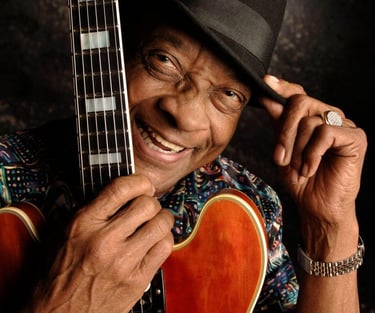

Hubert was a guitarist and singer who joined the Howlin' Wolf band at age 23, in 1954. Despite being fired by Wolf many nights and rehired the next day, Hubert stayed until Wolf's passing in 1976.
"Mention Hubert Sumlin, as well, because Hubert's a great man, and again, you know, I don't play the guitar very good, but when I'm playing this kind of music, I always have him in my mind. I wish I could play like Hubert." ~ Elvis Costello
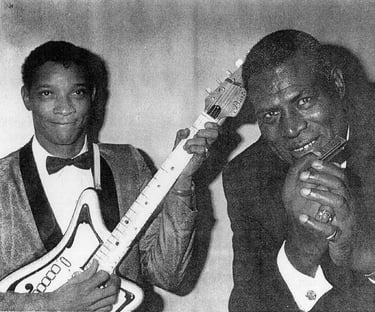

FREDDIE KING
Freddie, guitarist and singer initially known for instrumentals - Hideaway, San-Ho-Zay, the Stumble, etc., had an intuitive and aggressive style, incorporating the open string sound of Texas blues and the searing tones of Chicago's West Side, using thumb and middle finger picks (a style learned from Jimmy Rogers); served up by a 3-piece band (the economics of Chicago's West Side) which contributed to Freddie simultaneously being vocalist, lead and rhythm guitarist. The influence of the Chicago blues men and the R'n'B acts with whom he toured as a teen - Sam Cooke, Jackie Wilson, James Brown, etc. - contributed to Freddie's contemporary sound and his influence on and friendship with a younger generation of musicians including Peter Greene, Leon Russell, Eric Clapton, Stevie Ray and Jimmie Vaughn.
A fan favorite, he toured, played festivals around the world. won awards and made numerous recordings between 1976 and his passing at age 80, in 2011.
Hubert was known for his "wrenched, shattering bursts of notes, sudden cliff-hanger silences, and daring rhythmic suspensions"; and was ranked number 43 in Rolling Stone's "100 Greatest Guitarists of All Time".
"His patented vibrato technique – that slow, sultry sweep that quavers and pulsates with just the right shake, can fool a listener at first. One might think they’re hearing amp vibrato or tremolo, but watching Rush up close, you see it’s all right there, in his hands." ~ Frank Falduto - Vintage Guitar Magazine
BIG WALTER
"Big Walter" Horton, a shy, quiet musician, alternately known as “Shakey” or “Mumbles”, played harmonica with extraordinary power and unsurpassed tone. He was legendary both as an accompanist and soloist, including classic recordings by Jimmy Rogers, "Walkin’ By Myself", and Muddy Waters' "Hoochie Coochie Man".
"I met Big Walter Horton years ago at a North Side Chicago blues bar. Although his playing was loose, almost to the point of kidding with his band, he told them to stop playing at one point and then, just him alone on the harmonica, he ended the set by riffing on “Tea For Two” and expanding that standard into one of the most incredible blues harp performances I’ve ever heard, full of improvisation and musical quotations from a number of other tunes. In short — the man could play." ~Anno
BUDDY GUY
George "Buddy" Guy, a critically acclaimed guitarist and singer, has influenced some of the most notable musicians of his generation, including Eric Clapton, Jimmy Page, Jimi Hendrix and Stevie Ray Vaughan. In the 1960s Guy was a member of Muddy Waters' band and a house guitarist at Chess Records. He can be heard on Howlin' Wolf's "Killing Floor" and Koko Taylor's "Wang Dang Doodle" as well as on his own Chess sides and the touring and a series of records with harmonica player Junior Wells.
Ranked 30th in Rolling Stone magazine's list of the "100 Greatest Guitarists of All Time", Guy is known for his showmanship on stage: playing his guitar with drumsticks or strolling into the audience while playing solos. His song "Stone Crazy" was ranked 78th in Rolling Stone's list of the 100 Greatest Guitar Songs of All Time. Buddy’s solo career finally took off during the blues revival of the 1980s and 1990s.
“We used to have guitar battles every Sunday and Monday, with guys like Otis Rush and Magic Sam. It was like watching two tennis players or two boxers, they’d go at each other, but it was just making a living. One time, I came in with a 150-foot cord, walked in the door playing, and they just put their guitars down. And even now, if I don’t go off the stage, people ask if I’m feeling alright!” ~ Buddy Guy
Down in Mississippi, Jimmy learned to play guitar and harmonica from legendary sideman guitarist, Eddie Taylor. Jimmy's melodies were simple, guitar patterns hypnotic, harmonica playing piercing, and his singing, lazy. There was an infectious quality to Jimmy Reed's music that listeners enjoyed and bands felt inspired to perform and record, including the Rolling Stones, Beatles, Elvis and the Doors.
On the music of Jimmy Reed: “The music seemed to be very simple but later you learned that it was quite hard to be simple. “ ~ Bill Wyman - Rolling Stones
“…’61, ’62…We wanted to sell records for Jimmy Reed, Muddy, John Lee Hooker. We were disciples – if we could turn people on to that, then that was enough." ~ Ron Woods - Rolling Stones
JIMMY ROGERS
As an original member of the groundbreaking Muddy Waters blues band, Rogers developed a distinctive style marked by forceful chords and sinewy bass lines, helping to define the Chicago blues sound. He had many regional blues hits, put out numerous albums/CD's, and was equally proficient as band leader, sideman, or featured VIP artist with blues all-star groups. Little Walter's "Juke", Muddy Waters' "Hoochie-Coochie Man" and Sonny Boy Williamson's "Don't Start Me Talking" featured Rogers' outstanding guitar work.
In the early days, Jimmy, Muddy, and Little Walter would go from club to club where bands were playing, going in, and if they got a chance, "cutting head". "We called ourselves the Headhunters because we were the baddest group going.” ~ Jimmy Rogers
JOHNNIE JOHNSON
Johnnie Johnson was a pianist, singer, composer and arranger who played primarily in the St. Louis area. He is best known for songs associated with Chuck Berry which he wrote, co-wrote, arranged, and played on, including "Brown Eyed Handsome Man", "Johnny B. Goode", "Roll Over Beethoven", "Rock & Roll Music", "Sweet Little Sixteen", "School Days", "Reelin' and Rockin'", and "No Particular Place to Go". Johnnie was an in-demand studio musician, maintained his own band in St. Louis, toured with all star bands, and recorded until his passing in 2005.
“Nobody could play exactly like Johnnie Johnson, no, no… and that’s the reason why we were together so long, producing… music.” - Chuck Berry
FRANCIS CLAY
Clay's precision, jazz drumming flair, and musical arrangements helped define Chicago blues. He "...came to play with Muddy Waters’ band for 7 days and stayed 7 years," and was the arranger for songs including Mojo and Walkin' Thru the Park. Clay’s resume included working with Big Jay McShann, the big bands of Dizzy Gillespie, Cab Calloway, and Louie Bellson, and with the James Cotton Blues Band. His custom built drum kit included everything from double floor toms, and customized cymbals, to a set of timbales.
“Muddy would put two guitarists in front of me so that I wouldn't upstage him.” - Francis Clay

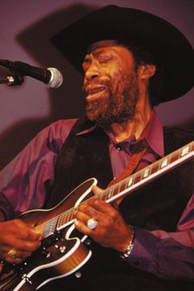
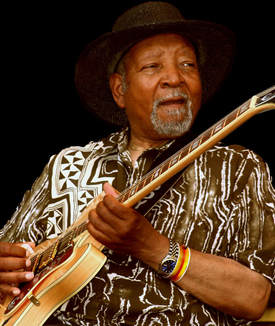

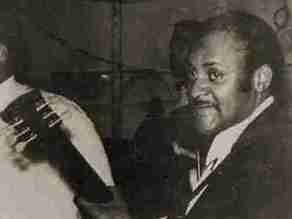

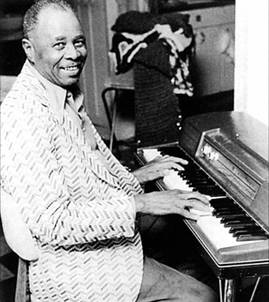

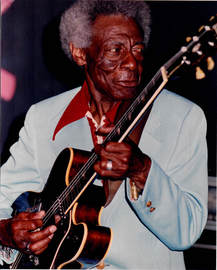

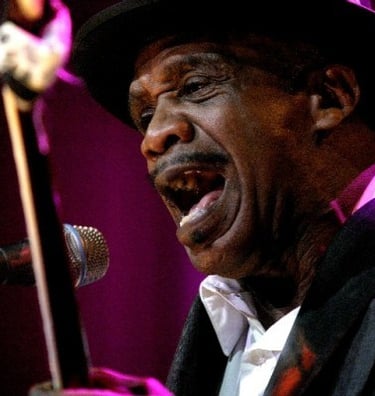

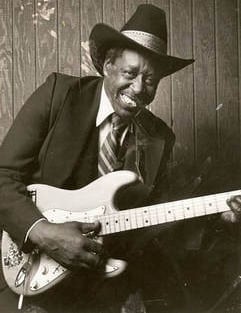

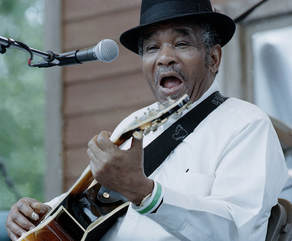

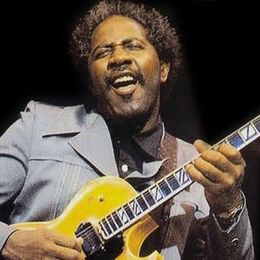

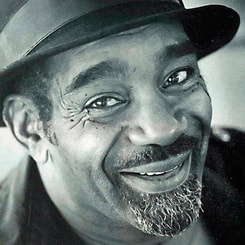

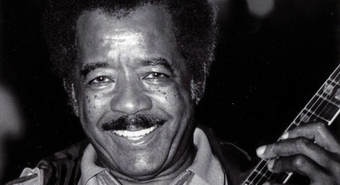

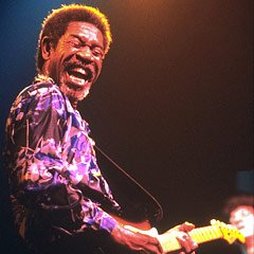

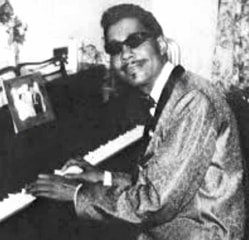

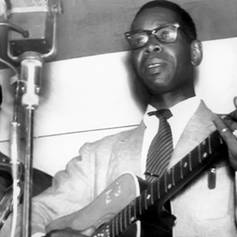

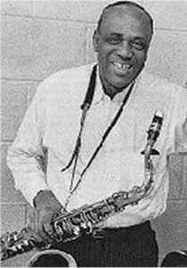

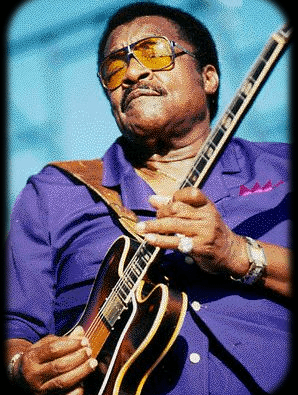

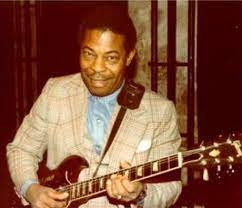

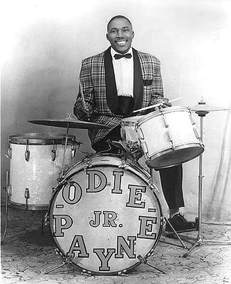

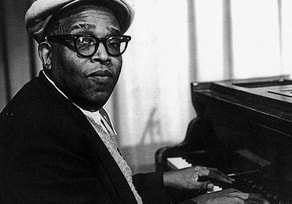

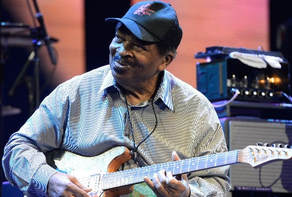

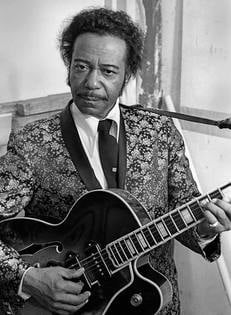



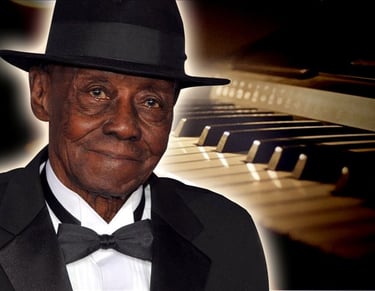

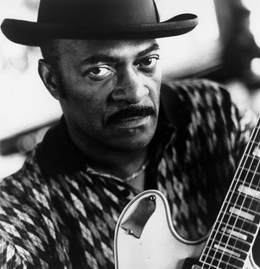

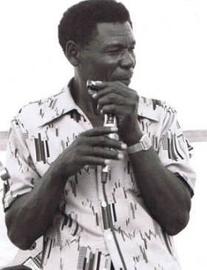

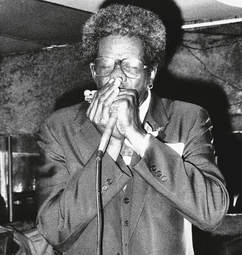

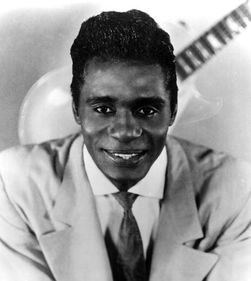

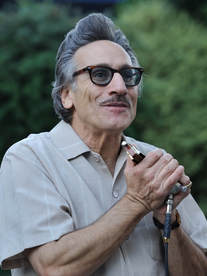

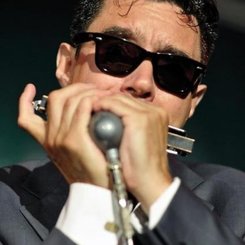

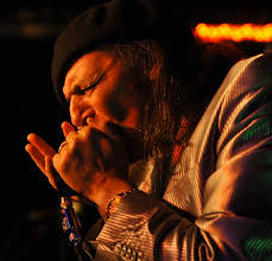

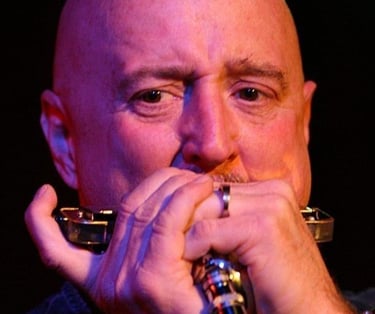

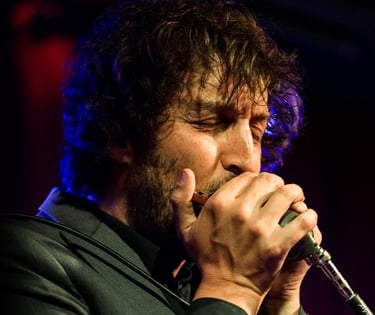

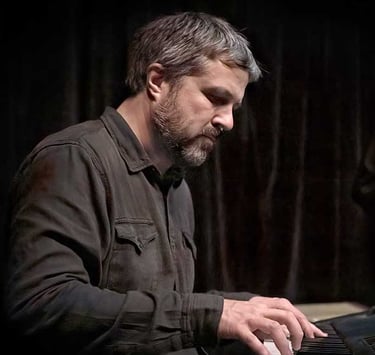

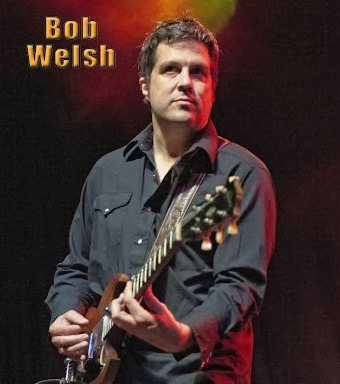

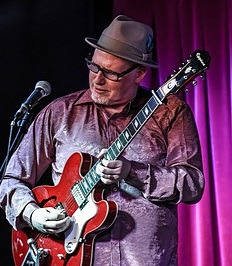

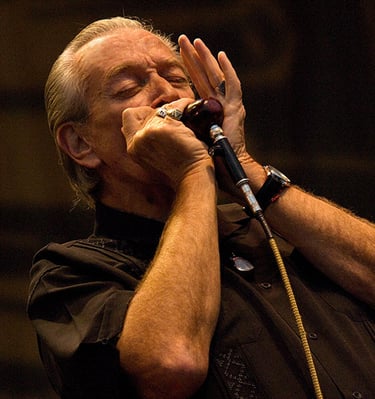

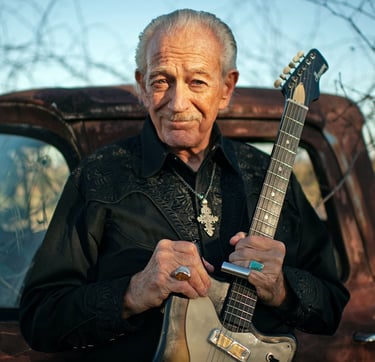


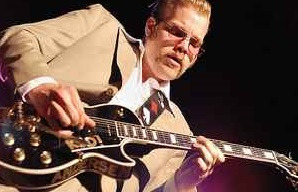
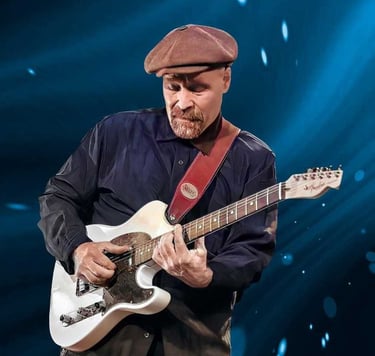

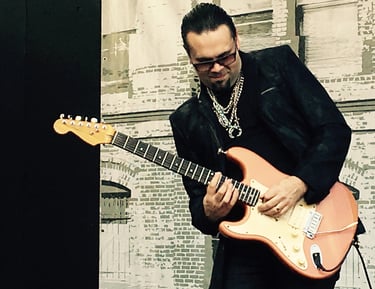

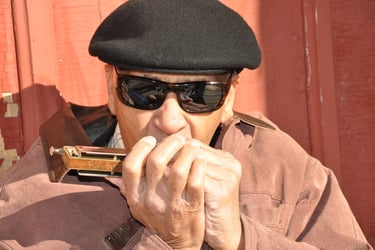



And, some jazzier blues inspirations too
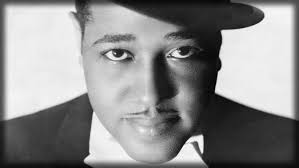

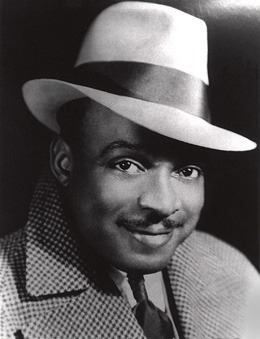

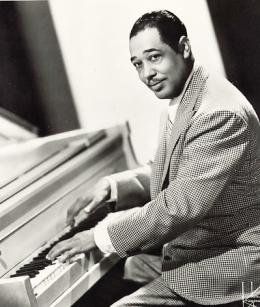

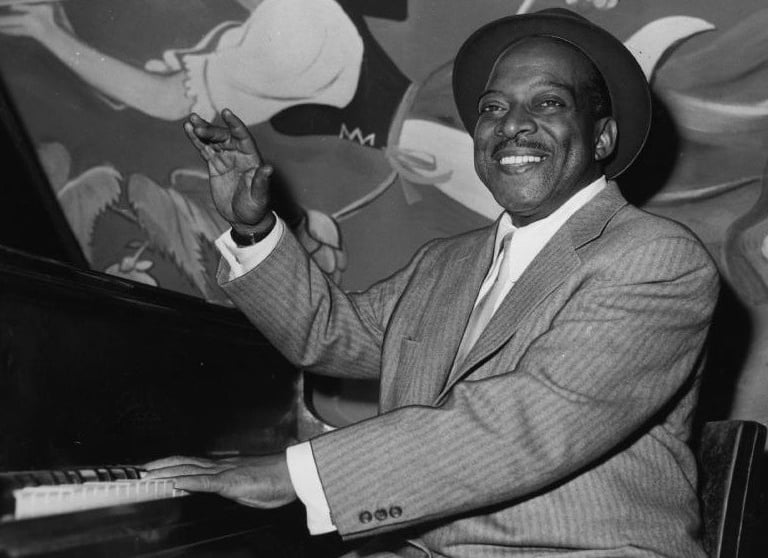


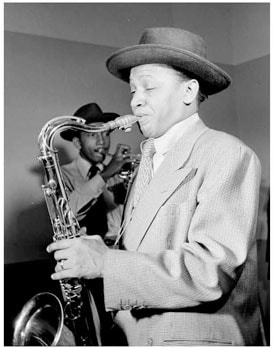
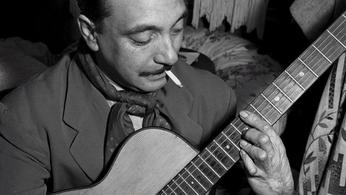

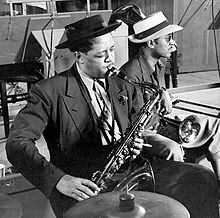

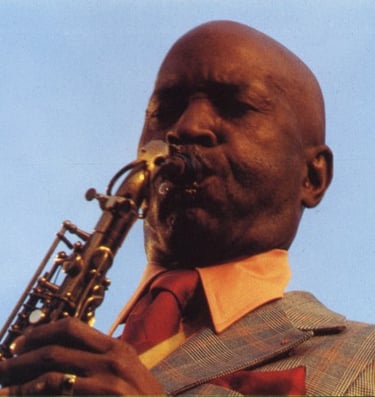

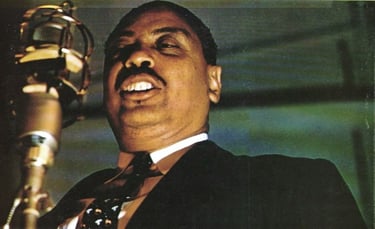

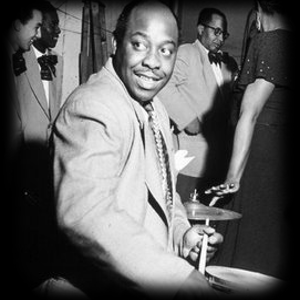

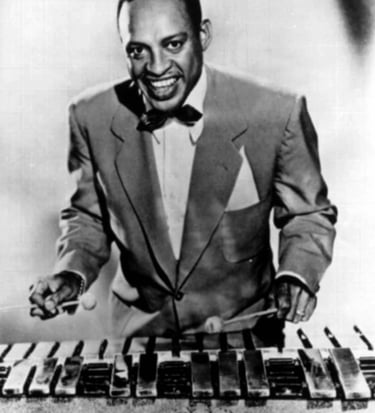

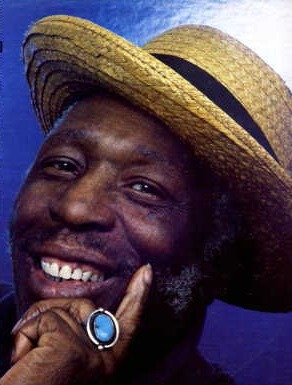

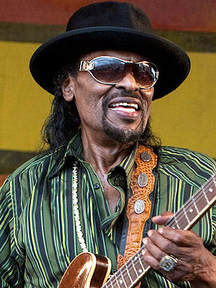

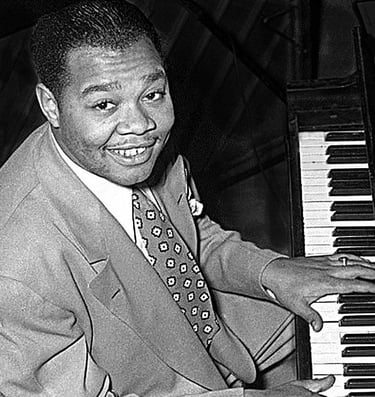

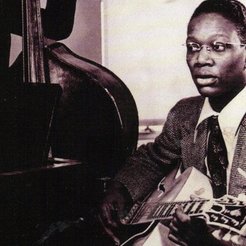

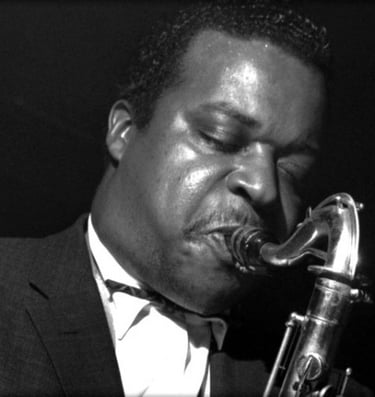

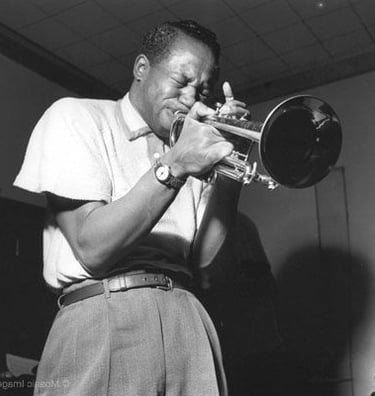

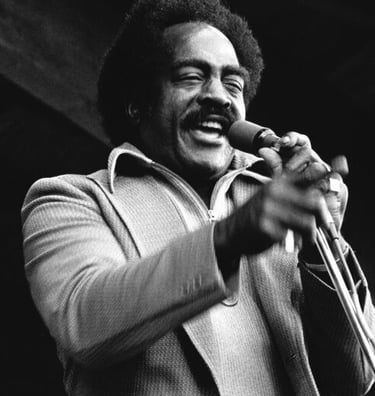

And so many, many more!
Jimmy Witherspoon


